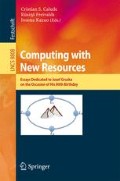Abstract
Reversible computing is a paradigm of computation closely related to physical reversibility. In this survey/tutorial paper, we discuss topics on reversible logic elements with memory (RLEM), which are used to build reversible computing machines. It is known that any reversible sequential machine (RSM) can be constructed systematically and simply from a rotary element (RE), a typical 2-state RLEM. It is also known that “all” non-degenerate 2-state RLEMs except only four are universal. Thus, RSMs can be built by any one of universal RLEMs. However, so far, no concise construction method has been given except the method of using RE. Here, we show a new simple method of composing RSMs from 2-state RLEMs of ID numbers 4-31 and 3-7.
This work was supported by JSPS KAKENHI Grant Number 24500017.
Access this chapter
Tax calculation will be finalised at checkout
Purchases are for personal use only
Preview
Unable to display preview. Download preview PDF.
References
Bennett, C.H.: Logical reversibility of computation. IBM J. Res. Dev. 17, 525–532 (1973)
Büning, H., Priese, L.: Universal asynchronous iterative arrays of Mealy automata. Acta Informatica 13, 269–285 (1980)
Fredkin, E., Toffoli, T.: Conservative logic. Int. J. Theoret. Phys. 21, 219–253 (1982)
Gruska, J.: Quantum Computing. McGraw-Hill, London (1999); Japanese translation: Morikita Publishing Co., Ltd, Tokyo (2003)
Keller, R.: Towards a theory of universal speed-independent modules. IEEE Trans. Computers C–23, 21–33 (1974)
Lee, J., Peper, F., Adachi, S., Morita, K.: An Asynchronous Cellular Automaton Implementing 2-State 2-Input 2-Output Reversed-Twin Reversible Elements. In: Umeo, H., Morishita, S., Nishinari, K., Komatsuzaki, T., Bandini, S. (eds.) ACRI 2008. LNCS, vol. 5191, pp. 67–76. Springer, Heidelberg (2008)
Morita, K.: A Simple Universal Logic Element and Cellular Automata for Reversible Computing. In: Margenstern, M., Rogozhin, Y. (eds.) MCU 2001. LNCS, vol. 2055, pp. 102–113. Springer, Heidelberg (2001)
Morita, K.: A new universal logic element for reversible computing. In: Martin-Vide, C., Mitrana, V. (eds.) Grammars and Automata for String Processing, pp. 285–294. Taylor and Francis, London (2003)
Morita, K.: Reversible computing and cellular automata – A survey. Theoret. Comput. Sci. 395, 101–131 (2008)
Morita, K.: Constructing a reversible Turing machine by a rotary element, a reversible logic element with memory. Hiroshima University Institutional Repository (2010). http://ir.lib.hiroshima-u.ac.jp/00029224
Morita, K.: Reversible Computing (in Japanese). Kindai Kagaku-sha Co., Ltd, Tokyo (2012). ISBN: 978-4-7649-0422-4
Morita, K., Ogiro, T., Alhazov, A., Tanizawa, T.: Non-degenerate 2-state reversible logic elements with three or more symbols are all universal. J. Multiple-Valued Logic and Soft Computing 18, 37–54 (2012)
Morita, K., Ogiro, T., Tanaka, K., Kato, H.: Classification and Universality of Reversible Logic Elements with One-Bit Memory. In: Margenstern, M. (ed.) MCU 2004. LNCS, vol. 3354, pp. 245–256. Springer, Heidelberg (2005)
Morita, K., Suyama, R.: Compact Realization of Reversible Turing Machines by 2-State Reversible Logic Elements. In: Ibarra, O.H., Kari, L., Kopecki, S. (eds.) UCNC 2014. LNCS, vol. 8553, pp. 280–292. Springer, Heidelberg (2014)
Mukai, Y., Morita, K.: Realizing reversible logic elements with memory in the billiard ball model. Int. J. of Unconventional Computing 8(1), 47–59 (2012)
Mukai, Y., Ogiro, T., Morita, K.: Universality problems on reversible logic elements with 1-bit memory. Int. J. Unconventional Computing (to appear)
Toffoli, T.: Computation and construction universality of reversible cellular automata. J. Comput. Syst. Sci. 15, 213–231 (1977)
Toffoli, T.: Reversible computing. Automata, Languages and Programming. LNCS, vol. 85, pp. 632–644. Springer, Heidelberg (1980)
Toffoli, T.: Bicontinuous extensions of invertible combinatorial functions. Math. Syst. Theory 14, 12–23 (1981)
Author information
Authors and Affiliations
Corresponding author
Editor information
Editors and Affiliations
Rights and permissions
Copyright information
© 2014 Springer International Publishing Switzerland
About this chapter
Cite this chapter
Morita, K., Ogiro, T. (2014). How Can We Construct Reversible Machines Out of Reversible Logic Element with Memory?. In: Calude, C., Freivalds, R., Kazuo, I. (eds) Computing with New Resources. Lecture Notes in Computer Science(), vol 8808. Springer, Cham. https://doi.org/10.1007/978-3-319-13350-8_26
Download citation
DOI: https://doi.org/10.1007/978-3-319-13350-8_26
Published:
Publisher Name: Springer, Cham
Print ISBN: 978-3-319-13349-2
Online ISBN: 978-3-319-13350-8
eBook Packages: Computer ScienceComputer Science (R0)

